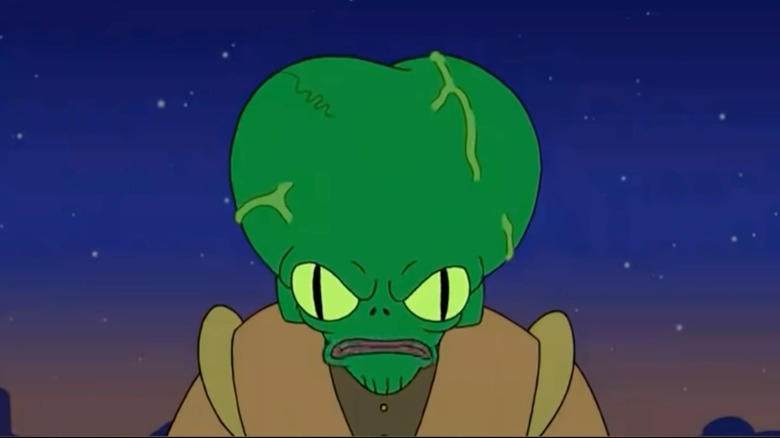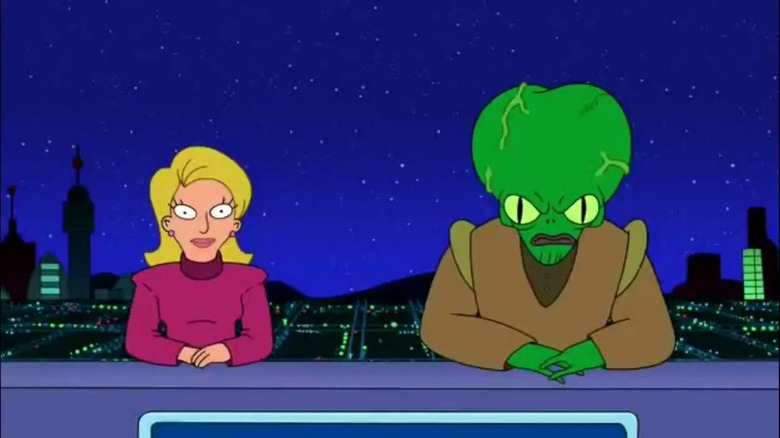The Futurama Team Had Trouble Finding Morbo's Voice, Until Maurice LaMarche Stepped In
One of the funniest "Futurama" characters is the newscaster Morbo (voiced by Maurice LaMarche). A green-skinned alien with an enlarged head (a design speculated to be based on the invaders from the 1957 B-movie "Invasion of the Saucer Men"), Morbo is implied to be an advance scout for an invasion of Earth — and does a terrible job hiding it.
In almost every scene he's in (which are public news broadcasts, mind you), he loudly proclaims his hatred for "puny Earthlings" and intent to conquer them: "All humans are vermin in the eyes of Morbo." His co-host, the cheery Linda (Tress MacNeille), always laughs off Morbo's blatant threats and hatred for humanity. The episode "The Prisoners of Benda" best encapsulates their dynamic with a five-second cold open:
Linda: "Tonight at 11"-
Morbo: "DOOOOM!"
So, Morbo's character is a pretty one-note joke, but it's a very funny joke. Most of this comes down to his booming voice ("Viewers trust a deep male voice and huge throbbing forehead veins!"). Even when his statements are more innocuous, he yells them out; in many scenes, he'll start talking at a room-appropriate even level and then explode in the following sentence. According to LaMarche, the show's creators didn't anticipate just how deep his voice could be.
Morbo's role on Futurama
"Futurama" gets a lot of mileage out of its main voice cast. LaMarche also plays Kif Kroker, Lrrr (ruler of the planet Omicron Persei 8!), the acting unit Calculon, the Horrible Gelatinous Blob, and more. Billy West voices Fry, The Professor, Doctor Zoidberg, Zapp Brannigan, and once-and-future President Richard Nixon (Morbo's "good friend").
Speaking to MTV in 2012, LaMarche revealed that West was originally cast to voice Morbo too; he played the character by doing an impression of John McLaughlin, host of the weekly public affairs program "The McLaughlin Group." McLaughlin's moderating style was loud and belligerent, but West's performance "wasn't fitting the mouth of the character", LaMarche explained. So, they brought him in. "Do a monster-y kind of voice. The humor of [Morbo] comes from a monster reading the news," said LaMarche, recalling his voice directions. "And so they pitch shifted it down and made it even deeper."
When LaMarche was brought back to do more of Morbo, he found he could hit the right pitch all by himself: "I wasn't aware that I wasn't supposed to do that, but they were surprised that I could do something that wasn't supposed to be possible." Morbo's voice does sound lower in his earlier appearances, but the original electronically altered pitch also sounded slower and less enthusiastic. Morbo's defining trait has evolved into less his evilness and more his short fuse. That's down to LaMarche's comic timing and fits a sensationalist TV pundit.
Take this moment in the "Futurama" movie "The Beast With A Billion Backs," when Morbo reports on a galactic anomaly:
"Scientists believe the rip is a gateway to another universe, but do not know what mysteries lie beyond. However, in this reporter's opinion — GRUESOME DEATH AWAITS US ALL!"
Let LaMarche's experience as Morbo be a warning to media companies enamored with new AI software: no machine can replace a talented voice actor.

